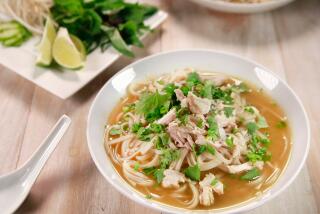Popping Pills Not a Quick Fix
- Share via
Airborne, the popular dietary supplement created by a germ-averse schoolteacher, no longer boasts that it can prevent your cold or ease the aggravating symptoms. Instead, the packaging says the effervescent pill helps “support your immune system.”
To many people, shoring up the body’s shield is a logical way to get through the cold and flu season, especially with the H1N1 virus lurking. But despite what marketers promise, there’s little evidence that herbal cocktails, vitamins, minerals and even specific foods have a beneficial effect on the immune system.
“It’s really impossible to boost your immune system instantly by taking a pill,” said Dr. Renee Scola, a primary care doctor at Northwestern Memorial Hospital. Immunity, or protection from germs, is often seen as the holy grail of health. It’s what parents want most for their children, according to the journal New Nutrition Business.
To enhance immunity, the thinking often goes, you simply need to get more immune cells circulating throughout the body. The herb echinacea, for example, has been shown to increase the function of white blood cells called macrophages, which can destroy invading germs.
The problem with that is scientists don’t know what level of immune system cells best helps the body resist disease. There is a wide variety of immune cells and it’s not known how they interact. The immune system, experts say, is a complex system that doesn’t need to be enhanced in healthy people.
“We know the immune system falters in extreme cases, but there’s a wide spectrum where it works fine,” said David Nieman, a researcher in exercise immunology and director of the Human Performance Laboratory at Appalachian State University. “You can’t boost it in that spectrum by adding nutrients.”
Most immune system claims are “misleading,” he said, adding: “You can’t strengthen the immune system by adding extra vitamins or minerals unless the person has a severe deficiency as a result of a disease like HIV.”
In general, a food or vitamin can “provide support” for body functions, said Richard Cleland, the FTC’s assistant director of advertising practices.
The immune system involves an elaborate network of cells, tissues and organs that functions like an army whose job is to defend the body against microbes that can make us sick.
When the immune system recognizes an enemy, it produces antibodies to help neutralize and expel the unwelcome visitor from the body. It’s a continual process in the skin, lungs and gastrointestinal tract..
There is good evidence that physical and emotional stress, a lack of sleep, a poor diet and binge drinking all can weaken the body’s protective shield.
In moderation, regular activity and exercising 30 to 60 minutes a day can have an astonishingly protective effect, he said. Exercisers can expect to reduce sick days by a third to a half; when they do get sick, the symptoms are less severe.
Sleep is thought to be another important factor related to immunity. In one study, published in the Archives of Internal Medicine, researchers gave study participants nasal drops containing a cold virus. Those who slept less than seven hours a night were three times more likely to get sick than those who slept eight hours a night.
At this point, researchers say, the best way to maintain a strong immune system is to keep your entire body healthy by incorporating the usual healthy living strategies: getting more sleep, reducing stress and eating a balanced diet.
More to Read
The biggest entertainment stories
Get our big stories about Hollywood, film, television, music, arts, culture and more right in your inbox as soon as they publish.
You may occasionally receive promotional content from the Los Angeles Times.









